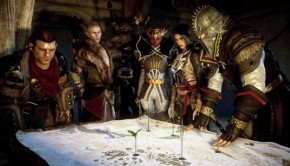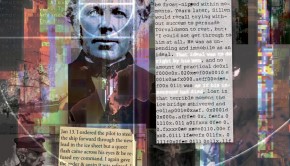Love Week: Don’t Take it Personally
Christine Love announced Hate Plus with an amusing theme song: “It’s Not Ero!!” The warning wasn’t really necessary; after Analogue: A Hate Story built an entire game around Joseon Dynasty genealogical mysteries and violent patriarchies, few would expect the sequel to be a fun, sexy time for gamers. This musical warning seems more appropriate for one of Love’s earlier games, released in April 2011: Don’t Take it Personally, Babe, It Just Ain’t Your Story. The game, while not particularly erotic, uses the explicit trappings of an erotic visual novel to challenge the player to consider questions of sexuality, privacy, and personal boundaries.
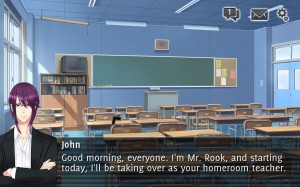 (This article contains spoilers; if you haven’t played the game already, it can be played for free and takes about an hour to complete.)
(This article contains spoilers; if you haven’t played the game already, it can be played for free and takes about an hour to complete.)
The year is 2027; you are 38-year-old John Rook, a down-on-his luck computer specialist who has taken a job as a teacher to make ends meet. You are not particularly interested in teaching or learning how to teach. Actually, you’re a terrible teacher. You should not be teaching. Distressingly, the only interest you seem to take in your students is a prurient one; you spend far more time thinking about who they’re dating and if they’re available than, say, lesson plans. Squicked out yet? So was Love. Despite the suggestive “hot for teacher” scenario, Don’t Take it Personally treats the idea of a 38-year-old teacher dating his 15-year-old high school student with discomforting accuracy. While no truly unspeakable lines are crossed, trust us: it’s not ero.
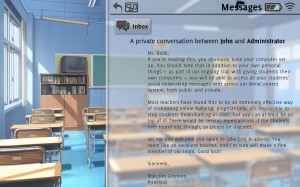 Perhaps Rook spends so much time thinking about his students’ personal lives because of his unprecedented access to their digital communications: in addition to their public “Amie” (Facebook) wall posts, he can read their personal messages to one another and anonymous “12chan” activity, as well as his own e-mails. He is a one-man panopticon, free to use and abuse every detail of his students’ lives.
Perhaps Rook spends so much time thinking about his students’ personal lives because of his unprecedented access to their digital communications: in addition to their public “Amie” (Facebook) wall posts, he can read their personal messages to one another and anonymous “12chan” activity, as well as his own e-mails. He is a one-man panopticon, free to use and abuse every detail of his students’ lives.
Here, Love pioneers the multithreaded datalog narrative style of the Analogue series; for every single line of “real world” dialogue, three of your students’ digital posts can pop up as commentary (all written in sometimes grating forum-fresh leetspeak). Most of the game is spent bouncing back and forth between the events of the “real world” and the Greek chorus of the multiple digital ecosystems. Left unchecked, the number of notifications vying for your attention can quickly spiral into the double digits, completely overwhelming whatever’s happening in the classroom. The imbalance is ludicrous, and that’s probably the point; no one person should be this involved in the minutiae of other people’s lives.
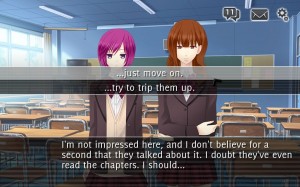 As a game, Don’t Take it Personally is barely there, even by the lenient standards usually applied to visual novels. Rook is not meant to be a role model, or even likable. While there are three endings, most choices have very little bearing on how the story unfolds. In one of the middle chapters, Rook can either advise a student to reunite with his boyfriend or to break the whole thing off. No matter your advice, the two get back together. (Remember: it just ain’t your story.) Rook is one of the all-time great absent gaming protagonists, up there with Ramses Alexander Moran.
As a game, Don’t Take it Personally is barely there, even by the lenient standards usually applied to visual novels. Rook is not meant to be a role model, or even likable. While there are three endings, most choices have very little bearing on how the story unfolds. In one of the middle chapters, Rook can either advise a student to reunite with his boyfriend or to break the whole thing off. No matter your advice, the two get back together. (Remember: it just ain’t your story.) Rook is one of the all-time great absent gaming protagonists, up there with Ramses Alexander Moran.
There’s a bit of A Twist at the end, where the students reveal they knew you were reading their personal posts all along. That’s not the twist. It’s this: it’s not that the students have no expectation of privacy, it’s that they have no idea what privacy even is. In the year 2027, the word has lost all meaning. The students expect that anything they post digitally will be shared, reshared, downloaded, tweeted, blogged, tumblr’d, and otherwise spread to the four winds. It’s not a violation of their trust-how could it be, when they never had any to begin with?
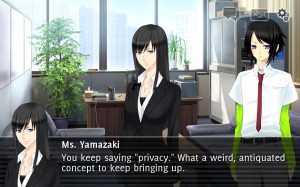 In 2011, this seemed like a logical extrapolation of digital social trends. But in 2013, it seems like the natural outcome of technological ones. A high school student in 2027 will have grown up in a post-PRISM, post-RSA world. She won’t have to assume her digital life might be insecure. She’ll know it is, as a matter of historical record.
In 2011, this seemed like a logical extrapolation of digital social trends. But in 2013, it seems like the natural outcome of technological ones. A high school student in 2027 will have grown up in a post-PRISM, post-RSA world. She won’t have to assume her digital life might be insecure. She’ll know it is, as a matter of historical record.
The students of Don’t Take it Personally know their digital lives are an open book for anyone to read. For anything to be truly less-than-public (is there a word for that?), encryption must be layered upon encryption. Charlotte, one of your high school students, wants to send a topless photo to her girlfriend Kendall, for her eyes only. So she adds another layer of password protection to the photo, a piece of information that just the two of them would know: Kendall’s middle name. Interestingly, this piece of information isn’t anywhere in the game text; it is completely impossible for the player (or for John Rook) to find out Kendall’s middle name through normal play.
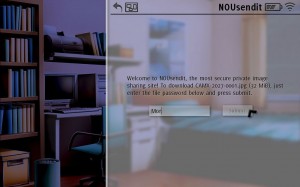 That information is, however, on Christine Love’s blog. And while Kendall’s full name isn’t in the game…Charlotte’s sexy photos are.
That information is, however, on Christine Love’s blog. And while Kendall’s full name isn’t in the game…Charlotte’s sexy photos are.
It’s brilliant. Other designers have broken the fourth wall by forcing you outside the game for a key piece of information, but rarely in a way that dovetails so cleanly with the game’s core themes. By making you leave the game world to find this information, it’s no longer Rook violating his student’s privacy: it’s you, the player. You can’t write it off as the latest in-universe instance of Rook’s creepy behavior. If you want to cross this boundary, then you have to own it.
And that’s what I remember most about Don’t Take it Personally, Babe, It’s Just Not Your Story. On the surface, it’s an interesting game that uses standard visual novel tropes to comment on issues of digital privacy and personal boundaries. And if it had stopped there, it would still be a good and interesting game. But it’s not content to get the player thinking about these issues; it wants to force him into making a distinctly uncomfortable choice, too. This game doesn’t just give you something to think about. It makes you live its credo.


